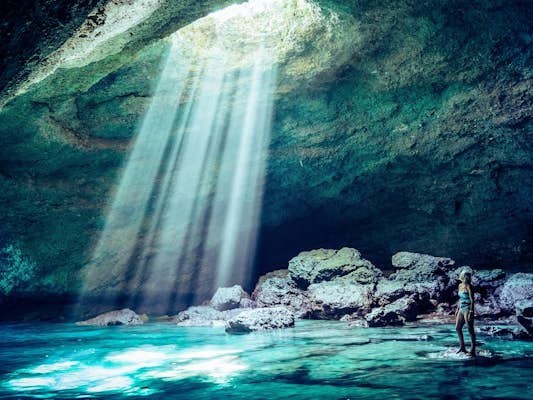As home to the world’s most accessible live volcano, the tiny island of Tanna in Vanuatu‘s south is the ideal place to plan an adventure.
Vanuatu is made up of 83 islands in the South Pacific. Its sixth largest, Tanna, is just 40km long and 19km wide, but packs in plenty to see and do. The island’s appeal lies in its wild tropical landscape and minimal development. Two thirds of the island’s 30,000 inhabitants live deep in the mountains and relish a simplistic way of life. Families are raised in thatched huts and produce is grown in the island’s rich volcanic soil. Throw in strong local traditions and warm Pacific Islander hospitality, and you’ve got yourself a top location for an adventure holiday.

Mt Yasur volcano
Tanna’s main drawcard is its active volcano, Mt Yasur. A thick plume of smoke constantly hovers above the mountain and acts as a beacon for visitors game enough to peer into its red-hot crater, poised for the intermittent eruptions that shoot streaks of glowing lava up to 200 metres into the air. A small visitor centre sits at the base of the mountain, from where guests are transported up the 360m-high mountain in 4WD vehicles. A steep 10-minute walk from the drop-off point leads to the crater rim.
It’s best to arrive late afternoon to admire the elevated view across the green plains and distant mountains in the daylight, then watch an impressive show of lava fireworks after dark. Yasur is a place to keep your wits about you. Heed local warnings and snap selfies with caution, as only a small section of the rim has a (rudimentary) guardrail.

Sulphur Bay hot springs
Sulphur Bay sits at the foot of Mt Yasur, and the villagers who live there have arguably bagged some of the best real estate on the island. Tropical palm trees fringe a long stretch of white sand, bordered by a mountain on one side and a rugged red cliff-face on the other. Beneath the cliff is a shallow hot spring, which runs a piping 60° C at its source, but feels like a pleasant hot bath as it flows downstream and dissipates into the ocean.
Scrub yourself down with the fine black ash of the riverbed as the warm water washes over you, then refresh with a dip in the cool sea. A few locals might be doing the same, given the spring acts as their permanent hot water tap. If asked politely, the residents will be all too willing to host a tour of their village.

Blue Cave
Tanna’s Blue Cave is a fine example of nature showing off. The cave is accessed via an unassuming entrance, naturally carved in a limestone cliff, and requires a sharp set of eyes (or preferably, a tour guide) to spot. A shallow duck-dive is then needed at high tide to pass through the opening before you pop up in something of a secret paradise.
Inside, a ray of light beams through an opening at the top of cave, creating an intense spotlight on the turquoise water. Smooth rocks jut out of the water around the cave perimeter and make the perfect place to sit and be soothed by the gentle lap of water. Don’t forget your waterproof camera or case for your smartphone.

Snorkelling and scuba diving
The waters off Tanna typically have excellent visibility, making the island a prime location for snorkelling and scuba diving. The White Grass Ocean Resort and Spa has the only PADI-accredited dive centre on the island, via Volcano Island Divers, and offers a range of courses for beginners through to seasoned divers. Following an assessment in the pool, go in search of the bale of green turtles known to grace the coral gardens offshore from the resort, and look out for eels, spotted rays and dolphins. Those without dive accreditation can head out with a snorkel.
Divers can choose from a series of other shore and boat dives, including the blue holes, connected by swim-through caverns; the wreck of MV Jean Percy, which sank in 14m of water after striking a reef; and Kamtiua Reef, where experienced divers can witness sheer drop offs and swim with yellowfin tuna and barracuda.

Yakel village
Time seems to have stood still in many parts of Tanna, and the best way to get an insight into the local way of life is to visit a mountain village. Yakel was made famous through the Oscar-winning film Tanna and is one of the most popular kastom villages (meaning it respects the island’s traditional way of life) to visit on the island.
After a rough 4WD trip through the mountains, be greeted with the tribe’s traditional dance as men, women and children sing and stamp the dirt dressed in grass skirts and loin sheaths. After the performance, let the locals lead you to their village, where chickens and pigs roam freely amongst thatched living quarters, and where the sound of children’s laughter echoes through the trees.
The lure of commerce hasn’t escaped the village people, so bring some cash if you want to pick up local handicrafts.
